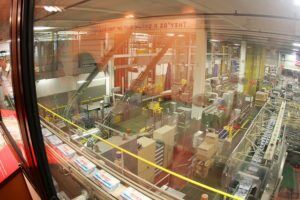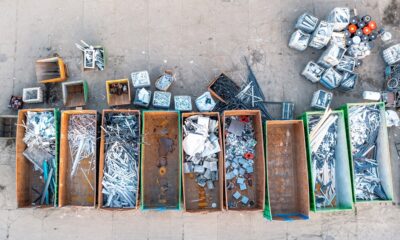

Environment
Here’s how to reduce the possibility of ‘production scrap’
All manufacturers are aware of the possibility of ‘production scrap’ even when all they strive hard for is the production of flawless products. It is a truth widely acknowledged that wherever quality standards are looked after, the inevitability of the creation of a certain amount of scrap comes in. Basically, what amounts to scrap is wastage in the form of metal shavings or debris and faulty products which result from a manufacturing activity.
To elaborate, in the processing of copper, whatever copper is unable to meet the specified level of quality norms and is rejected for further processing becomes the part of copper scrap. Hence, scrap can be seen as something that indicates the level of incompetence of the manufacturing process. It is viewed as a physical manifestation of time, money and efforts that have been wasted.
So, now the question is how to reduce the amount of scrap during production in order to save money? Read on to find out two of the proven ideas that you can apply to your production processes and save money.
#1: Make use of exact tools and equipment for a specific job: This makes sense especially when you are looking forward to the ways of saving your processes from generating scrap. Avoiding the creation of excess scrap would mean that you need to make your process precision-based. That is to say in this situation, you cannot make just any cut on the product’s surface. You need to be very precise in order to reduce the amount of scrap generated from the entire process. The tools and techniques that you would use to profile metals would be the deciding factor of how much tolerant you need to get with the scrap creation. This also boils down to one thing that with a mere revision of the design of your components and parts, you can work towards making your manufacturing processes scrap-proof.
#2: To keep human errors at minimum, avoid manual handling of delicate parts: The more automated systems get, the better. Automation not only addresses the safety of workers by minimizing their role in risky conditions, but it also takes care of the parts that are being assembled. The fact that machines never stop working unless they break down or demand maintenance and service (which is too once in a while) makes them have the edge over workers who tend to tire, fell sick, get injured, etc. more often than not. If you have the scope for automation, then prefer to automate and bring your manufacturing process many steps closer to perfection. By automating, you will set up a machine to handle a given task with a fair amount of precision, which will in turn lower the amount of wastage and thus, generate less scrap.
Now the thing is that even if you apply these ideas that focus on helping you reduce the amount of waste generated during the production stage, you cannot totally avoid scrap. Scrap is going to be there; all you can do is control the extent of its creation. But what is to be done with the scrap that you cannot ignore to generate? How about recovering money from copper recycling prices or whatever metal you are using for the manufacture of your product? Yes, you can hand scrap metal over to the recyclers and ask for copper scrap price. This would surely help to mitigate the loss due to wastage.
In conclusion, as soon as you make your production super efficient, you can bring down the extent of scrap metal you think of generating. This would need you to take into consideration everything and everyone involved in the process of production. And the scrap copper metal that you cannot avoid generating can be traded with the recyclers at a copper recycling price. After all, a smart businessman leaves no chance of alleviating his loss.


 Environment12 months ago
Environment12 months agoAre Polymer Banknotes: an Eco-Friendly Trend or a Groundswell?

 Features11 months ago
Features11 months agoEco-Friendly Cryptocurrencies: Sustainable Investment Choices

 Features12 months ago
Features12 months agoEco-Friendly Crypto Traders Must Find the Right Exchange

 Energy11 months ago
Energy11 months agoThe Growing Role of Solar Panels in Ireland’s Energy Future




























